Building your own digital platform used to mean hiring a development team, burning through a budget, and waiting months just to launch. Not anymore. In 2025, white label platforms have become the fast lane for creators, entrepreneurs, and startups who want to launch branded apps, communities, or content spaces — without starting from scratch.
A white label platform is a pre-built product you can fully rebrand as your own. You control the name, visuals, pricing, and content — but the tech is already there. Whether you’re building a niche dating app, an exclusive content site, a mobile social network, or a private learning hub, the foundation is ready to go.
This model is exploding across industries: content monetization, online coaching, adult communities, and creator-based subscription networks. With demand rising and the creator economy maturing, more businesses are turning to white label platforms to scale faster — and keep full ownership while they’re at it.
What Makes a Great White Label Platform in 2025?
The idea of launching a fully branded app or site used to sound like something only big tech companies could do. But now, white label platforms have made it possible for solo creators, niche communities, and even adult content entrepreneurs to launch polished, scalable products — without ever touching code.
Still, not all white-label solutions are created equal. A good one might help you launch fast. A great one will keep up when your audience grows, your features evolve, and your brand matures.
What to Look for in a White Label Solution
- Custom branding options — not just logos and colors, but full control over layout, messaging, and domains.
- Built-in monetization — support for subscriptions, one-time payments, gated content, and tiered memberships.
- Native communication tools — video chat, messaging, comments, or even bots, depending on your audience.
- Media handling — including video uploads, audio files, private galleries, and livestreaming if needed.
- User roles and permissions — from moderators to VIPs, the ability to define access levels is a must.
- Mobile-first performance — today’s users live on phones. Any white label social media platform that doesn’t prioritize mobile UX is behind the curve.
- Integrations and growth potential — APIs, add-ons, and third-party tools that let you scale beyond launch.
According to Statista, SaaS usage across small businesses and creators has more than doubled in the last five years. That makes 2025 a turning point. The best whitelabel software isn’t just convenient — it gives you ownership without the overhead. No compromises, no renting space on someone else’s brand. Just your platform, your rules, and your revenue.
If you’re serious about building a presence that looks and feels like your own — not just another profile on a third-party network — it’s worth investing in the right foundation.
Top White Label Platforms for Creators and Entrepreneurs
There’s no shortage of white-label tools, but not all of them work for creators or small brands. The platforms listed here were chosen for usability, scalability, and how well they support independent creators. They help users build, monetize, and manage branded digital platforms without starting from scratch.
Some focus on communities. Others support subscriptions, communication, or even adult-friendly content. Each one stands out in 2025 for a specific reason. Whether you’re a coach, influencer, or niche brand, you’ll find something that fits your vision. These platforms can help you launch faster and grow with fewer limits.
Kajabi

Who it’s for
Kajabi is tailored for online educators, solo course creators, and coaching professionals who want a polished, branded digital storefront to sell knowledge, without hiring developers or piecing together a tech stack.
Core features
It combines tools for creating and delivering digital courses, running email marketing campaigns, setting up subscriptions, launching landing pages, and managing customer relationships — all in one clean interface. You also get access to customizable templates, basic community spaces, and analytics dashboards.
Strengths
Kajabi’s all-in-one approach means everything works together right out of the box. From your website to your checkout pages to your email list, it’s built to support productized knowledge. Branding is flexible enough for most users, and it’s easy to get a professional look without design skills.
What’s missing
The built-in community tools are fairly limited. You’ll find comments and simple groups, but not deep engagement tools like events, gamification, or advanced roles unless you integrate third-party tools or upgrade to premium plans.
Ideal use case
Kajabi is perfect for entrepreneurs who want to build a branded course-based business with basic social features. It’s still a strong community platform for creators — especially those who value simplicity and monetization-first features over in-depth community interaction.
Mighty Networks
Who it’s for
Mighty Networks is aimed at creators, coaches, and entrepreneurs who want to build tight-knit, branded communities with courses, memberships, and native mobile access. It’s especially attractive to those who want to build engagement around a personal brand or niche audience.
Core features
The platform includes a powerful set of tools for building a branded website, managing memberships, and hosting online courses. You also get mobile apps, content feeds, live events, and group chats — all wrapped inside your own branded ecosystem. Users can pay to access specific areas or participate in gated events.
Strengths
Where Mighty Networks shines is in its community-first focus. The user interface encourages daily interaction, member discovery, and content sharing. You can also launch your own mobile app with their branded app program, giving creators even more control over audience experience.
What’s missing
Customization beyond branding is limited. You can’t dramatically alter layouts or build totally custom workflows without moving into enterprise pricing. It also lacks full API flexibility for advanced developers.
Ideal use case
For creators who care more about interaction than presentation — and want their brand to live at the center of a lively, monetized community — Mighty Networks is a smart pick for anyone looking for white label community software that works out of the box.
Disciple Media
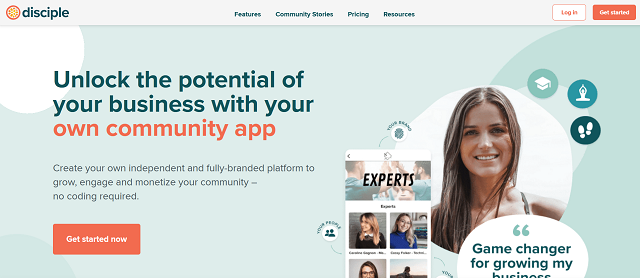
Who it’s for
Disciple Media works well for influencers, coaches, lifestyle brands, and thought leaders building branded mobile apps.
It helps creators move their audience off social media into a private, monetized space they fully control.
Core features
Disciple offers white-label iOS and Android apps, web access, community feeds, live streaming, direct messaging, and group structures customizable to your needs. You can establish public or private groups, collect membership fees, and offer exclusive content through in-app functionality and push notifications.
Strengths
The biggest advantage is the native mobile experience. Unlike other tools that focus on web-first delivery, Disciple builds mobile from the ground up. The app feels smooth, modern, and completely yours — from icons to navigation to notification tone. It’s also strong on member segmentation and post visibility controls.
What’s missing
It’s not the cheapest option — pricing starts at a few hundred per month. And while it offers good branding control, you’ll still be limited to their system architecture unless you go fully custom with their enterprise team.
Ideal use case
Disciple is a great fit if you’re building a white label social media platform that needs a strong mobile presence and active community features. It works especially well for creators with loyal followings who want deeper, ongoing engagement away from the noise of public networks.
Bettermode (formerly Tribe)
Who it’s for
Bettermode is designed for B2B brands, SaaS companies, and product-based businesses that want to build customer communities, support hubs, or knowledge-sharing spaces. It works especially well for those who want their community deeply integrated into their product or website.
Core features
The platform includes customizable spaces, user groups, content feeds, events, Q&A sections, and robust moderation tools. Bettermode also supports SSO, analytics, and integrations with tools like Slack, Zapier, Intercom, and HubSpot. Its API lets developers embed community elements directly into their apps.
Strengths
Bettermode is highly modular. You can configure your space to behave like a forum, an idea board, a social network, or a product support zone. The white labeling is strong — with brand control, custom domains, and embeddable widgets that feel native inside other platforms.
What’s missing
Its interface feels more functional than fun — which might not suit creators looking for flashy community experiences. It’s also more focused on utility than entertainment or monetization features.
Ideal use case
If your business needs a white label social media software solution that integrates tightly into your product or support flow — and you value structure over flash — Bettermode is a smart, developer-friendly option.
WotNot
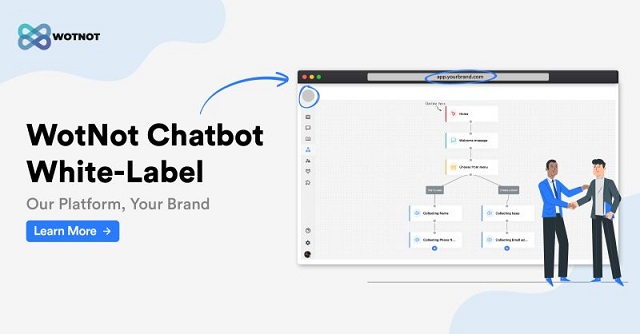
Who it’s for
WotNot is made for agencies, SaaS companies, and startups that want to offer automated customer support, lead capture, or client onboarding using branded chatbot systems. It’s especially popular among digital service providers that need a client-facing communication app white label solution.
Core features
WotNot includes a visual, drag-and-drop chatbot builder, multi-channel deployment (including websites, Facebook Messenger, and WhatsApp), live chat fallback, analytics, and CRM integrations. You can fully brand the chatbot interface, reports, and even the chat widget to match your own or your client’s identity.
Strengths
The interface is intuitive — no coding needed — and you can launch professional-looking bots in minutes. It’s great for building interactive flows like surveys, appointment scheduling, or handling FAQs. For agencies, WotNot supports client dashboards and white-labeled access portals.
What’s missing
It’s focused purely on messaging and automation — not built for broader community interaction, content delivery, or social networking. Also, it lacks deeper customization unless you’re on higher-tier plans.
Ideal use case
WotNot is ideal if your business needs a flexible, branded chatbot solution for sales, support, or onboarding. It’s not a full community tool, but for messaging-focused use cases, it’s one of the top communication app white label tools available in 2025.
ActiveCampaign
Who it’s for
ActiveCampaign is a go-to solution for marketing agencies, SaaS providers, and small businesses that want to offer powerful, branded email marketing and automation tools under their own name. It’s especially useful for those who want to give clients a hands-off CRM and email system that looks and feels like their own platform.
Core features
This platform delivers one of the most complete email automation toolkits on the market. From behavior-based email triggers and customer journey mapping to detailed segmentation and CRM integration, ActiveCampaign handles it all. The white-label version allows you to customize the interface, strip away ActiveCampaign branding, and present the entire experience on a custom domain — all while maintaining full control over campaign assets and client accounts.
Strengths
Its depth of automation is unmatched in its price range. You can create complex funnels, tag behaviors, and personalize emails at scale. For agencies, the ability to manage multiple client environments under one umbrella while keeping everything white-labeled makes it extremely efficient.
What’s missing
ActiveCampaign doesn’t offer traditional community-building tools, so it’s not the right choice if your project involves forums, content feeds, or direct user interaction like a white label social media software solution might require.
Ideal use case
Agencies that focus on email marketing, lead nurturing, or CRM services — and want a polished, branded platform — will find ActiveCampaign flexible, powerful, and ready to deploy under their own identity.
WhiteLabelDating.com
Who it’s for
WhiteLabelDating.com is geared toward entrepreneurs and niche marketers looking to build dating communities without developing the tech themselves. Whether you’re targeting general dating, lifestyle-specific audiences, or adult verticals, it’s a plug-and-play system for launching a white label tinder app with built-in monetization.
Core features
This platform gives you access to a pre-built dating engine with features like member profiles, private messaging, photo uploads, subscription management, and location-based matching. You can choose from different templates, apply your branding, and focus on user acquisition and monetization.
Strengths
You don’t need to worry about development or backend hosting. The platform includes fraud prevention, customer support, analytics, and built-in moderation tools. You can earn through revenue share, and the company even assists with affiliate marketing strategies.
What’s missing
Customization is limited to brand and content — you won’t have full control over design structure or feature logic unless you’re part of their enterprise-level partnerships. Also, the UI feels a bit dated compared to modern mobile-first apps.
Ideal use case
If you want to enter the dating app space quickly, especially in underserved niches, WhiteLabelDating.com is a trusted option to launch your own white label tinder app without building from scratch.
xFans / Adent.io
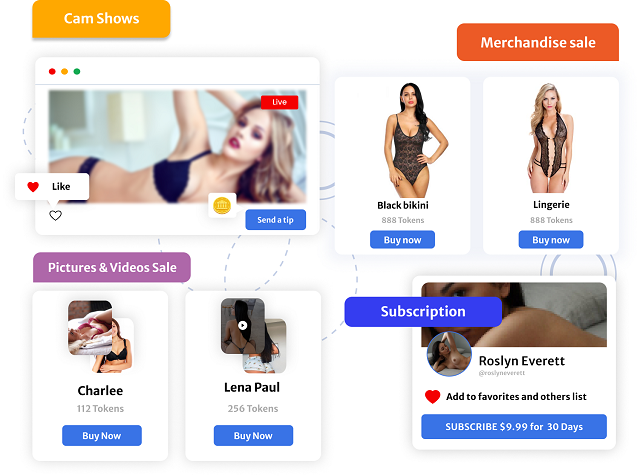
Who it’s for
xFans, developed by Adent.io, is designed specifically for adult content creators, NSFW influencers, and entrepreneurs in the adult industry. It’s one of the few white label platforms that openly supports adult content while giving creators full control over monetization and branding.
Core features
xFans includes subscription management, tipping, pay-per-view content, media galleries, live streaming support, and direct messaging. You get a white-labeled backend that can be customized with your domain, colors, logo, and platform name. Built-in payout systems and user moderation tools are included by default.
Strengths
This platform stands out in a space where many SaaS tools are restrictive or outright ban adult content. It’s also tailored to monetization, with flexible payment models and fan engagement tools. Adent provides full development support, making it more than just a plug-and-play solution.
What’s missing
Unlike creator tools like Kajabi or Mighty Networks, xFans isn’t designed for traditional education or general-purpose communities. You’ll also likely need some developer help to get the most out of its deeper customization options.
Ideal use case
If you’re looking for white label social network examples specifically in the adult creator space — and you want to launch fast without breaking compliance rules — xFans is a serious contender among white label platforms in 2025.
Why More Brands Are Choosing White Label in 2025
There’s a massive shift happening in digital business. In 2025, more people than ever are ditching third-party platforms and launching their own white label platforms. From online coaches and personal trainers to adult content creators and micro-celebrities, the trend is unmistakable: owning the platform beats renting space on someone else’s.
According to Grand View Research, the global SaaS market is projected to grow at a CAGR of 12.0% from 2025 to 2030, reaching USD 819.23 billion by 2030. What’s fueling it? The creator economy — which now includes over 205 million people globally — and the explosive growth of digital-first niche communities.
Creators are realizing something powerful: if you’re building content and community, you shouldn’t be giving away your audience or revenue. And with the rise of white label platforms, they don’t have to.
Launching your own branded app or website isn’t just about ego. It’s about control — over design, data, pricing, and the entire user experience. You’re no longer one account away from being demonetized or de-platformed. You own the system.
The Real Reasons Behind the Shift to White Label
Here’s why more creators and entrepreneurs are going white label in 2025:
- Brand identity matters — you define how your platform looks, feels, and communicates
- Better monetization — sell memberships, offer premium content, and retain full earnings
- Community ownership — you decide who joins, what they access, and how they engage
- Compliance freedom — no third-party terms throttling your audience
- Long-term growth — scale your community or customer base without switching platforms
For creators in high-risk or underserved markets — like adult content, cannabis, political commentary, or even fringe hobbies — a social network white label setup is no longer optional. It’s essential. You need a place where your rules apply, your users are protected, and your monetization is sustainable.
The same goes for coaches, consultants, and educators who are tired of algorithm games and affiliate cuts. Owning a white label platform gives you real business equity — not just an audience, but infrastructure.
In 2025, power is shifting toward creators who build their own ecosystems. The question isn’t “why go white label?” anymore. It’s “why wouldn’t you?”
Scrile Connect: Build a White Label Platform That’s Truly Yours

Off-the-shelf tools are great for getting started — but what happens when your growth outpaces their limits? When you need more control over features, payments, branding, or user experience, generic SaaS starts to feel like a ceiling. That’s where Scrile Connect comes in.
Scrile Connect isn’t just another product in the marketplace. It’s a full-scale white label development service built for creators, consultants, educators, adult entertainers, and niche founders who are ready to build something entirely their own. No templates. No “one-size-fits-all” dashboards. Just a platform tailored to your exact business.
Their team builds platforms that include:
- Video calls, built-in messaging, livestreams, and user-to-user chat
- Media libraries for audio, video, photos, and private content
- Gated content, subscriptions, tips, and pay-per-view systems
- Custom domains, full branding, flexible UI design, and monetization logic
- Member roles, moderation tools, and multi-tier access
The difference? You own it. You own the users, the codebase, the features — even the payment flow. Scrile doesn’t just host your brand — they help you create a truly independent product. Unlike most white label platforms, which run on restrictive SaaS infrastructure, Scrile Connect offers full customization from backend to frontend.
So if you’ve outgrown generic platforms and want a product that adapts to you — not the other way around — it’s time to make a serious move.
Reach out to Scrile for a free consultation or to map out your custom platform. Whether you’re building a private community, a subscription video network, or an adult creator space, Scrile Connect can bring your idea to life — your way.
Conclusion
The market for white label platforms in 2025 is more dynamic than ever. From course creators to adult influencers, more entrepreneurs are stepping away from third-party apps and launching branded experiences they truly own. The technology is there. The demand is real. And the advantages — from monetization control to platform independence — are hard to ignore.
There’s no one perfect platform for everyone. Some need drag-and-drop tools; others require deep customization. But for creators who are ready to scale — and want real control over their community, content, and revenue — white labeling isn’t just an option. It’s the smartest way forward.
If you’re serious about launching your own platform — with the freedom to grow it your way — Scrile Connect is where you start. Custom-built, scalable, and made to match your vision, it’s the foundation for creators who aren’t just building audiences — they’re building empires.
Read Also
Cryptocurrency Payment Gateways – Accept crypto payments securely and globally on your platform.
Social Media Monetization – Turn your followers into revenue with smart content strategies.
Fleet Management Software Development Company – Build robust, scalable logistics platforms for transport businesses.
Driver Tracking App – Monitor routes, improve safety, and manage drivers in real time.
Facebook Group Alternative – Create a private, branded space for your audience without relying on Meta.

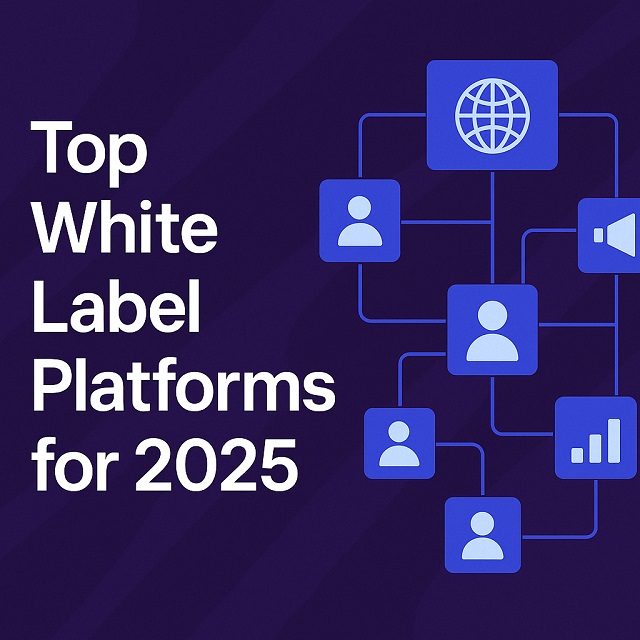

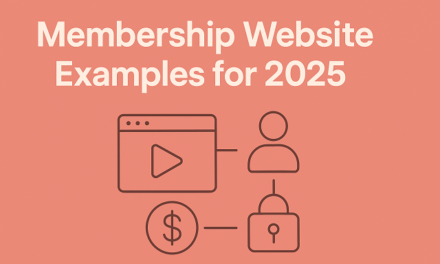


Really comprehensive list! I’ve been comparing Kajabi and Mighty Networks for launching my course site — this helped clarify their strengths.
Just started building with Scrile Connect, and the flexibility is insane compared to other white label tools I’ve tried.
WotNot looks super promising for my agency clients who need chatbot automation under their own brand. Thanks for the breakdown!
I had no idea ActiveCampaign offered white label CRM — that’s a huge win for marketers offering automation as a service.
For adult creators, xFans is a rare gem. Most platforms restrict content too much. Good to see it included here.
This article confirmed what I was already thinking: owning your own white label platform is the only way to future-proof a creator business.
Anyone here used Bettermode for building a support-focused community? I’m looking for something that integrates with HubSpo
Disciple Media is definitely the best mobile-first platform I’ve tried. Smooth experience for members and looks super professional.
WhiteLabelDating.com seems like a good entry point for niche dating sites — curious if anyone’s had success with monetization on it?
Love how this article explains the “why” behind going white label. Control, compliance, and full ownership are game-changers in 2025.